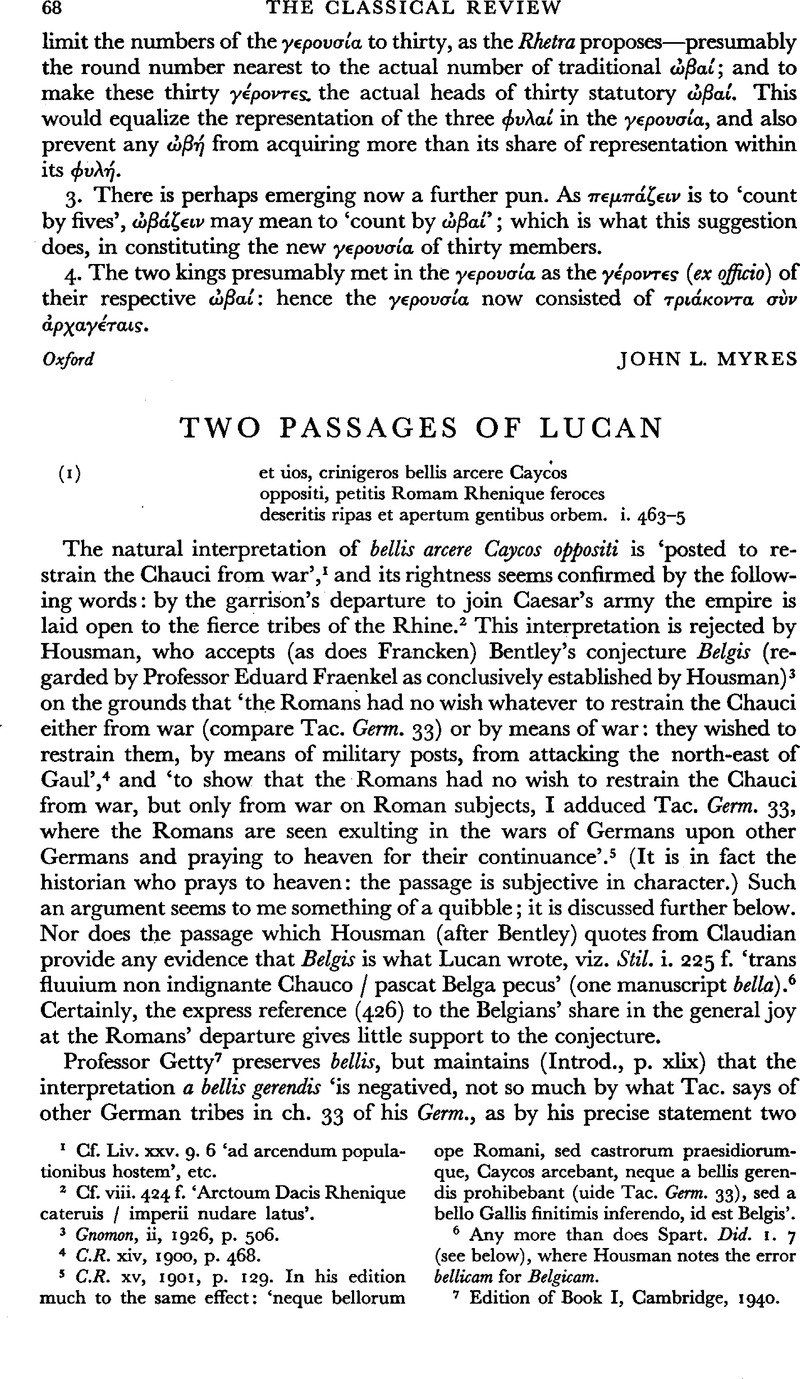No CrossRef data available.
Article contents
Two Passages of Lucan
Published online by Cambridge University Press: 13 February 2009
Abstract

- Type
- Review Article
- Information
- Copyright
- Copyright © The Classical Association 1951
References
page 68 note 1 Cf. Liv. xxv. 9. 6 ‘ad arcendum populationibus hostem’, etc.
page 68 note 2 Cf. viii. 424 f. ‘Arctoum Dacis Rhenique cateruis / imperii nudare latus’.
page 68 note 3 Gnomon, ii, 1926, p. 506.
page 68 note 4 C.R. xiv, 1900, p. 468.
page 68 note 5 C.R. xv, 1901, p. 129. In his edition much to the same effect: ‘neque bellorum ope Romani, sed castrorum praesidiorumque, Caycos arcebant, neque a bellis gerendis prohibebant (uide Tac. Germ. 33), sed a bello Gallis finitimis inferendo, id est Belgis’.
page 68 note 6 Any more than does Spart. Did. 1. 7 (see below), where Housman notes the error bellicam for Belgicam.
page 68 note 7 Edition of Book I, Cambridge, 1940.
page 69 note 1 C.R. xv, 1901, p. 79.
page 69 note 2 To which Housman rejoined (C.R. xv, 1901, p. 130) ‘they are very well chosen, and they are not a pars pro toto’. Professor Getty also (Introd., p. xliii) toys with the notion of pars pro toto (though he knows better than to use so childish a term). He is worried because the Chauci did not dwell near the Rhine and thinks ‘It is possible to say that Caycos = Germanos by synecdoche’. But Pliny, erroneously or not, puts the Chauci on the Rhine, viz. Nat. iv. 101 ‘in Rheno autem ipso … nobilissima Batauorum insula et Cannenefatium et aliae Frisiorum, Chaucorum, Frisiauonum … quae sternuntur inter Helinium ac Fleuum’. We may note too the statement (referred to by Professor Getty) of Tac. Germ. 35 that the tribe stretched southwards as far as the Chatti (whose territory extended from the Rhine), No doubt the activities of the Chauci beyond their own domains led to some confusion as to their habitation. In any case it is idle to press the words Rheni feroces ripas too closely; the point is that for Lucan the Chauci lived somewhere beyond the Rhine, but did not always stay beyond it (see below).
page 69 note 3 Cf. J. G. C. Anderson on Germ. 35. 1: ‘Tac. had obviously little information about the Chauci and confines himself to their general qualities, which he idealizes at the expense of truth’. There is no mention of them in Caesar.
page 69 note 4 See Pauly-Wissowa, R.E., s. ‘Chauci’.
page 70 note 1 The Thes. Ling. Lot. gives no guidance, making no distinction between this passage and numerous routine instances.
page 70 note 2 So at least ZMV, Heitland, Postgate, Housman, Ponchont, expellere G, aduertere PU, Hosius, ‘non male’ Housman.
page 70 note 3 In his review of Housman's edition in C.R. xli, 1927, p. 32.


